 |
 |

|
 |
 |
 |
 |

Books by Other Publishers |
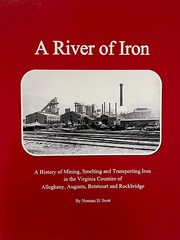 |
A River of Iron |
A History of Mining, Smelting and Transporting Iron in the Virginia Counties of Alleghany, Augusta, Botetourt and Rockbridge
For over 100 years iron was “king” in the Valley of Virginia. Millions of dollars were invested and thousands of workers toiled in the vast enterprise of smelting iron. But by 1929 it was all over; the last of Virginia’s blast furnaces had closed. How did it all begin and what were the forces which enabled the rise and caused the subsequent fall of the iron industry?
This 357-page history of four Virginia counties, Alleghany, Augusta, Botetourt and Rockbridge, details the advent of the early bloomery forges, then the cold-blast charcoal furnaces and finally the large hot-blast coke furnaces which transitioned Virginia through its iron age. Transportation and mining techniques are described. Fifty seven furnaces and over 125 mines are listed and detailed. Over 150 photos, documents and maps illustrate this story. Virginia’s iron age is over but its history should never be forgotten
By Norman H. Scott |
| |
A River of Iron |
SKU# 138.02 |
$19.95 |
 |
|
|
|
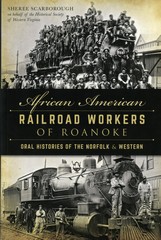 |
African American Railroad Workers of Roanoke |
| The N&W, now the Norfolk Southern Corporation, has been in Roanoke for over a century. Since the company has employed many of the city's African Americans, the two histories are intertwined. The lives of Roanoke's black railroad workers span the generations from Jim Crow segregation to the civil rights era to today's diverse corporate workforce. Older generations toiled through labor-intensive jobs such as janitors and track laborers, paving the way for younger African Americans to become engineers, conductors and executives. Join author Sheree Scarborough as she interviews Roanoke's African American railroad workers and chronicles stories that are a powerful testament of personal adversity, struggle and triumph on the rail.
Softcover, History Press
By Sheree Scarborough |
| SKU# 138.183 |
$19.95 |
 |
|
|
 |
Better Take Two Guns |
The N&W's Special Agents (Railroad Detectives) and their W. Va. Cases.
"If you're goin to Mingo County, youd better take two guns!"
Unidentified N&W passenger, 1905
This book documents the N&W special agents (railroad detectives) and their cases in a rough timeline from 1899 to the end of 1958 in West Virginia. Book recommended to anyone with an interest in West Virginia, in policing, or in railroads for an intimate portrait of the intersection of all three.
Black and white with some photos/illustrations, 212 pages
By Jack L. Dickinson and Kay Stamper Dickinson |
| SKU# 138.132 |
$25.95 |
 |
|
|
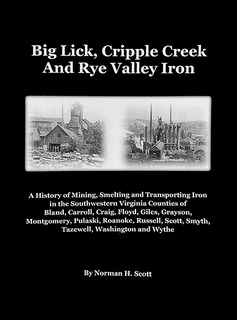 |
Big Lick, Cripple Creek and Rye Valley Iron |
History of Mining, Smelting and Transporting Iron in the S. W. Virginia Counties of Bland, Carroll, Scott, Smyth, Tazewell, Washington, Wythe
Few people know of the significant contribution made by southwestern Virginia to the iron history of Virginia and the nation. Southwestern Virginia is part of the 300-mile-long valley sandwiched between the Blue Ridge and Allegheny mountains and extends from Front Royal in the north to Bristol in the south. While this area lacked the early river transportation infrastructure enjoyed by the other iron-producing regions of the valley, it contained one of the richest deposits of iron found in Virginia. Once the Norfolk & Western Railway was established, iron was mined and smelted in prodigious amounts. Twenty-four charcoal furnaces operated in the region before the Civil War and twenty-six were in blast after the conflict, including ten hot-blast coke furnaces capable of producing over 100 tons of iron per day.
From the beginning of the iron era, which utilized small bloomery forges, to the end when the mammoth coke furnaces were king, southwestern Virginia had contributed to the Virginia iron age for over 150 years. The iron histories of Bland, Carroll, Craig, Floyd, Giles, Grayson, Montgomery, Pulaski, Roanoke, Russell, Scott, Smyth, Washington and Wythe counties are included in this 340-page book along with 130 maps, diagrams and pictures.
Also described are the use of bloomery forges during the early settlement of southwestern Virginia, the development of transportation used to ship iron materials, how the charcoal and coke furnaces worked, the effects of the Civil War and Great Boom on iron production, formation of consortia including the Virginia Iron, Coal and Coke Company, construction of railroads used to reach the iron deposits and extraction of iron ores from the ground. Over forty-five iron furnaces are described and numerous iron mines are detailed. The book also concludes with an examination of the future of iron production for the region.
By Norman H. Scott |
| |
Big Lick, Cripple Creek and Rye Valley Iron |
SKU# 138.01 |
$19.95 |
 |
|
|
|
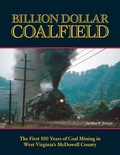 |
Billion Dollar Coalfield |
| Follow the N&W’s main
line, branch lines, and
spurs as the railway hauls
coal from West Virginia’s
McDowell County,
– the heart of the
“Billion Dollar Coalfield”
NWHS member, Alex Schust, tells
the story of the first 100 years of
the industrialization of McDowell
County by following the N&W
as it tunneled through Coaldale
Mountain to reach the mining
operations on Elkhorn Creek in
1888, through the construction of
the last major mining operation at
Munson, WV in 1947.
Hardcover, 640 pages, 516 B/W photographs |
| SKU# 138.144 |
$75.00 |
 |
|
|
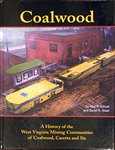 |
Coalwood |
| Coalwood spans the history of the Carter Coal Company and the three communities built in the wilderness of McDowell County. The Coalwood narrative weaves historical information with the personal accounts of the people who lived and worked in the communities.
by Alex P. Schust |
| SKU# 138.111 |
$49.95 |
 |
|
|
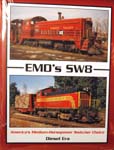 |
EMD's SW8 Locos |
| EMD introduced the 800 horsepower SW8 in 1950. Over the next four years, GM built 366 SW8's for 49 U.S. and Canadian customers. Class 1 carriers received 217 units, 97 went to short lines and terminal roads, and 52 to industrial operators, and each owner gave the units their own distinctive look. Some of these units went to the Wabash, which subsequently was merged into the Norfolk and Western. This book details the history of this medium-power unit with more than 250 color and black-and-white photos. 8.5"x11", 80 pages |
| SKU# 138.69 |
$19.95 |
 |
|
|
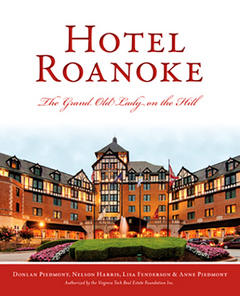 |
Hotel Roanoke - The Grand Old Lady on the Hill |
| Please Note: This book is awaiting a reprint, and we do not know exactly when it will be available. We will hold your order and let you know as soon as it becomes available. The Hotel Roanoke is as old as the city of Roanoke itself. It opened in 1882, when the city became the headquarters for the Norfolk & Western Railway, and signaled the city’s progress. The Hotel was owned by the N&W and is a subject close to the heart of many N&W fans. This revised and updated version of Donlan Piedmont’s Peanut Soup and Spoonbread: An Informal History of the Hotel Roanoke captures the amazing history of not only a hotel but also the personalities and stories that have made the Hotel Roanoke what it is today—a remarkable blend of century-old tradition and state-of-the-art hospitality.
176 pages, softcover with many photos. NOTE: This book is awaiting a reprint as it sold out before our order was processed.
By Donlan Piedmont, Nelson Harris, Lisa Fenderson & Anne Piedmont |
| |
Hotel Roanoke - The Grand Old Lady on the Hill |
SKU# 150.157 |
$29.99 |
 |
|
|
|
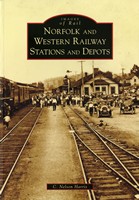 |
IMAGES of Rail: N&W Railway Stations and Depots |
| Compiled by C. Nelson Harris
Contains carefully selected archival images from the renowned historical Norfolk and Western photograph collection housed at Virginia Tech. These images, many never before published, date back nearly a century and convey the storied past of life along the rails.
B&W, softcover, 128 pages.
|
| SKU# 138.141 |
$21.99 |
 |
|
|
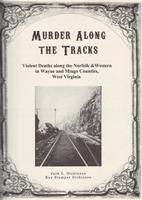 |
Murder Along the Tracks |
Violent Deaths along the Norfolk & Western in Wayne and Mingo Counties, West Virginia
Hardcover, 308 pages
By Jack L. Dickinson and Kay Stamper Dickinson |
| SKU# 138.161 |
$29.95 |
 |
|
|
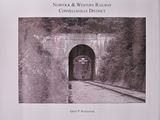 |
Norfolk & Western Railway Connellsville District |
Pictorial book starting with the early 1962 99 year lease between the N&W and the P&WV., ending May 1990 when it was included in the new W&LE.
Hardbound with dust jacket, 144 B/W pages
By Gene P. Schaeffer |
| SKU# 138.140 |
$50.00 |
 |
|
|
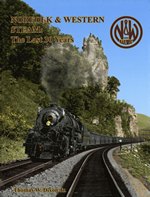 |
Norfolk & Western Steam The Last 30 Years |
| N&W perfected its operation of steam locomotives in the 1930s-40s and was so efficient with them that it resisted dieselization longer than any other railroad. This book gives an overview of N&W steam locomotives operating in the period 1930-1960 with emphasis on the three classes that were the backbone of the fleet in that era: J-class 4-8-4s, A-Class simple articulated 2-6-6-4s, and the many Y-classes of 2-8-8-2 compound articulated.
Hardcover, 112 pages, TLC Publishing
by Thomas W. Dixon, Jr. |
| SKU# 138.166 |
$29.95 |
 |
|
|
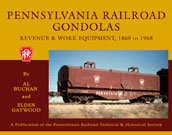 |
Pennsylvania Railroad Gondolas Revenue & Work Equipment, 1869 - 1968 |
by Al Buchan and Elden Gatwood 2011
A 156 page book includes an Introduction covering an overview of freight cars and gondolas; PRR Gondolas from GA to G44, gondolas in Work Equipment service and an Epilog.
There are over 350 photos many with cars under load, in addition to numerous car diagrams and information tables. The book is in landscape format, 8½" x 11", on heavy paper, color and B&W. |
| SKU# 132.207 |
$25.00 |
 |
|
|
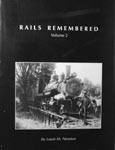 |
Rails Remembered - Vol 2 |
by Louis Newton
Recollections of railroading in the immediate post WWII era. The early chapters include Continental railroading while the author served with U.S. occupation forces in Italy. Later chapters are devoted to railroad operations in Knoxville, TN and other locations in the Southeast. Hard cover |
| SKU# 138.24 |
$59.95 |
 |
|
|
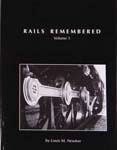 |
Rails Remembered - Vol 3 |
by Louis Newton
The author's account working as a special apprentice in the N&W's Mechanical Department from 1950 to March 1953. Describes operations in Shaffers Crossing as well as construction of new steam locomotives in the Roanoke Shops. Also covers trips over the Abingdon and North Carolina branches. Hard cover |
| SKU# 138.25 |
$59.95 |
 |
|
|
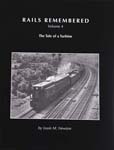 |
Rails Remembered - Vol. 4 -Tale of a Turbine |
by Louis Newton
In a continuation of the "Rails Remembered" series, the author gives an amazing account of N&W's last efforts to waylay the arrival of the diesel, with the creation of a steam-turbine electric locomotive. It was given the Class No. TE-1, numbered 2300... but the world knew it as the "Jawn Henry." The experiment was a failure, and the unit existed only 3-1/2 years, being retired in 1957. Mr. Newton was employed by the N&W at the time, and had first-hand knowledge of this amazing machine.
The book includes construction photos, charts, comparative data, and many publicity photos. Hard cover |
| SKU# 138.75 |
$59.95 |
 |
|
|
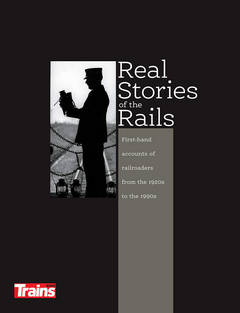 |
Real Stories of the Rails |
| First-hand accounts of railroaders from the 1920s to the 1990s
Collected from the pages of Trains Magazine
Real stories from the pages of Trains Magazine. Employee stories and real-life experiences in working on the railroad from the 1920s through the 1990s with most from the 1950s and after. Fascinating reading. Relatable to the N&W and all railroads and features a story by our own Ed King!. Stories finally collected in a single place. A must have for folks who like to read true tales of the rails.
192 pages, softcover
By Trains Magazine |
| |
Real Stories of the Rails |
SKU# 150.152 |
$24.99 |
 |
|
|
|
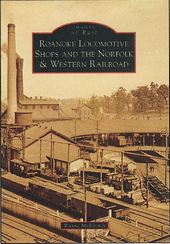 |
Roanoke Locomotive Shops and the N&W |
| The Roanoke Shops have been an indispensable part of the Roanoke Valley for more than 125 years. This pictorial history chronicles the history since its founding in 1881. With more than 200 images, many of which have never been published. Includes history from the Roanoke Machine Works days, N&W and on to current NS operations.
Authored by NWHS member Wayne McKinney.
Softcover, 128 pages, Arcadia Publishing
By Wayne McKinney |
| SKU# 138.180 |
$21.99 |
 |
|
|
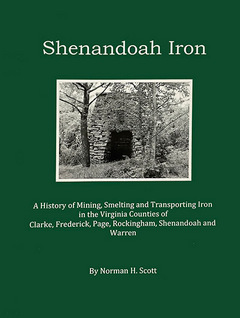 |
Shenandoah Iron |
A History of Mining, Smelting and Transporting Iron in the Virginia Counties of Clarke, Frederick, Page, Rockingham, Shenandoah and Warren
Most people know of the rich Civil War history of the Shenandoah Valley of Virginia but few know that the Valley was also rich in iron smelting history. The first furnace west of the Blue Ridge Mountains was built in this region.
For over 144 years the area produced iron ore and smelted ore into pig iron. The region’s iron history covered the eras of the bloomery forge, charcoal cold-blast furnace and finally hot-blast coke furnace. “Shenandoah Iron” includes the transporting, mining and smelting activities of this industrial enterprise and explains in detail how iron ore is transformed into iron.
Over 24 cold-blast furnaces are described and the two modern hot-blast furnaces are depicted. Over 80 iron mines are identified. The contributions of German-Americans who settled the valley and dominated the iron business are highlighted. The practice of industrial slavery and the impact of the Civil War on the iron industry are explored. This 350 page book includes 137 photographs, maps and drawings to illustrate the contributions that the Shenandoah counties of Clarke, Frederick, Page, Rockingham, Shenandoah and Warren made to the iron smelting industry of the Shenandoah Valley of Virginia.
By Norman H. Scott |
| |
Shenandoah Iron |
SKU# 138.03 |
$19.95 |
 |
|
|
|
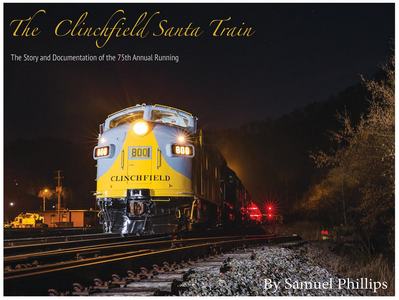 |
The Clinchfield Santa Train |
| The 75th Anniversary of the Santa Train in November of 2017 was a truly special event that was the talk of the rail fan world. A beautifully restored FP7 cab unit painted as Clinchfield 800 was the lead power for this special trip trailed by a SD45 in Clinchfield colors. Samuel Phillips had exclusive access to shoot much of the trip and recorded some truly magnificent images. Beautifully reproduced in full color, this book is also Samuel’s tribute to one of his favorite railroads; the Clinchfield. Samuel is an outstanding young photographer who’s work has been featured in many places including Trains Magazine, the Railroad Explorer and many others. This is an outstanding photographic record of a truly special train. For those readers who do not know, the Santa Train on the former Clinchfield has been running for 75 years and brings Santa to the remote and beautiful area of Southwestern Virginia and Kentucky, Santa distributes candy and gifts to many families in this economically depressed area.
48 page softcover 11 x 8.5 inch book. All-color.
By Samuel Phillips |
| |
The Clinchfield Santa Train |
SKU# 139.212 |
$19.95 |
 |
|
|
|
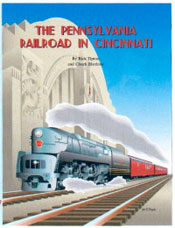 |
The Pennsylvania Railroad in Cincinnati |
Co-authored by Rick Tipton and Keystone editor Chuck Blardone 2004
Before the Civil War, Cincinnati was the biggest town in “The West” - larger than St. Louis, and far larger than Chicago or Cleveland. Once the Pennsylvania Railroad reached Pittsburgh, Cincinnati was the great inland city to which the Railroad had to connect.
This book brings together photos, historical materials, and company records from sources both local and nationwide. It thus combines knowledge and images never before brought together. The book explores yards, stations, interlocking plants, and motive power over the 100 years the Pennsy came into Cincy, and shows that this part of the System was made up of both “standard” and highly nonstandard components. The 160 pages include 305 photos, three paintings, nine sidebars, six maps, and 44 assorted tables, posters, and track diagrams. All color originals are reproduced in color.
The book’s major sections include:
- notes on the Pennsy’s local history and the Company’s relationship to other railroads in town
- descriptions and photos of locations listed in employee timetables
- roster and action shots of PRR steam and diesel in Cincinnati
- detailed history and consists of the Cincinnati Limited
- photo section dedicated to sleepers of the Cincinnati Limited
|
| SKU# 138.202 |
$25.00 |
 |
|
|
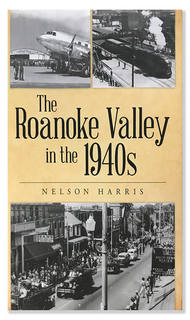 |
The Roanoke Valley in the 1940s |
| The history of the Roanoke Valley during the 1940s has largely been unexplored until now. The Class J locomotives, Woodrum Field, Victory Stadium, Carvins Cove, the Roanoke Star, the end of streetcars, and the advent of drive-in theaters among much more marked the decade. Local historian Nelson Harris provides a detailed account of this dynamic decade along with 300 archival photographs. This book is intended to be a continuation of the long out of print Raymond Barnes “History of the City of Roanoke”. Barnes’ history only covered in depth the years through 1940, as that was his primary interest. This volume picks up in depth coverage of that decade.
Limited stock
662 pages, hardcover 6" x 9" format
By Nelson Harris |
| |
The Roanoke Valley in the 1940s |
SKU# 138.103 |
$74.95 |
 |
|
|
|
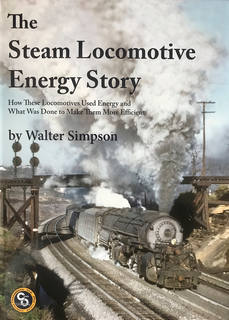 |
The Steam Locomotive Energy Story |
| Brand new landmark book regarding American steam locomotive history and technology, Walter Simpson’s hardbound, 144-page The Steam Locomotive Energy Story: How These Locomotives Used Energy and What Was Done to Make Them More Efficient. Using original sources from a variety of railroads, such as the Chesapeake & Ohio Railway, the Norfolk and Western Railway, and the Pennsylvania Railroad, as well as other authoritative books and articles by the mechanical engineers who worked to make the steam locomotive more effective, Mr. Simpson has produced a work that is both a scholarly review and a highly-readable, understandable discussion that readers with all levels of expertise can readily appreciate and enjoy. Visually pleasing and authoritative, the hardbound book is well illustrated with great photos in both B&W and color showing all types of steam locomotives at work. Precise diagrams compliment this work throughout its pages, creating a steam locomotive reference that will enrich the reader’s library for years to come.
The Steam Locomotive Energy Story has already been receiving high praise from reviewers who have seen the finished work. Speaking about this publication, Thomas W. Dixon, Jr., of the C&O Historical Society, stated that, “[this book is] the best discussion of steam locomotive efficiency ever done. Simpson understands and documents how the steam engine builders and railroads worked to increase efficiency, yet the very design of the machine prevented much increase in capability, even in the much-heralded ‘Super Power’ locomotives post-1925.” Mr. Dixon added that The Steam Locomotive Energy Story is a scholarly review, fully footnoted with an extensive bibliography, and it should assume an important place in the literature of locomotive steam power in the United States.
In his work, Mr. Simpson concludes that a good steam locomotive could convert 7% of its fuel to mechanical energy, and most locomotives did not reach that level, while the very best only reached the range of 8% efficiency. A typical diesel-electric locomotive, by contrast, produces around 30-35% efficiency. And, for further comparison, an electric generating plant is 33% efficient, and an automobile about 25%.
Walter Simpson was energy officer for the State University of New York at Buffalo for 26 years and holds master degrees in philosophy and environmental studies. With this education, experience, and background, he was able to approach this subject from an entirely different perspective from other railroad authors. Mr. Simpson has also published Diesel-Electric Locomotives with Simmons-Boardman and Turbine Power (available from the Commissary) with the publisher Kalmbach. The latter has been hailed as the best treatment thus far of how railroads (including the N&W Railway and C&O Railway) tried to use steam-turbine locomotives as an alternative to advancing diesel technology.
By Walter Simpson |
| |
The Steam Locomotive Energy Story |
SKU# 138.100 |
$38.95 |
 |
|
|
|
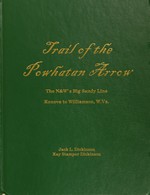 |
Trail of the Powhatan Arrow |
The N&W's Big Sandy Line
Kenova to Williamson WV.
Timeline roughly from 1902 to July 1958. In 1902 the final survey for the Big Sandy line began, and July 1958 marks the end of steam engines on the Powhatan Arrow.
300 page, hardcover
by Jack L. Dickinson and Kay Stamper Dickinson |
| SKU# 138.118 |
$29.95 |
 |
|
|
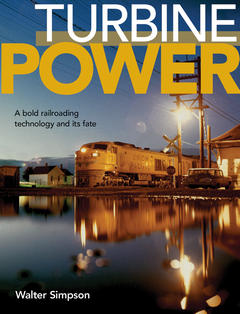 |
Turbine Power |
| A bold railroading technology and its fate
Are there any other better words to describe it? Turbine Power by Walter Simpson is a new book that covers steam and gas turbine locomotives and trains, how they functioned, and the technology used from the 1939-2003 era that made them go.
This is the first book that brings together information about turbine locomotives and trains that collects all of the various projects in one place. From first prototypes to the most recent proposals, everything is presented with vintage images and references that all railroad fans will enjoy.
This book will be of special interest to N&W fans, as the 2300, Jawn Henry is specifically covered and the Society provided much support and a number of images for the book.
128 pages, softcover
By Walter Simpson |
| |
Turbine Power |
SKU# 150.151 |
$22.99 |
 |
|
|
|
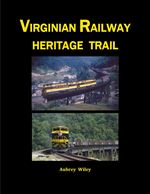 |
Virginian Railway Heritage Trail |
| NWHS member Aubrey Wiley is the man behind the creation of the Virginian Heritage trail and the author of this book.
Containing over 175 pictures plus maps, the 90 page, hardback book covers the Virginian from its formation in 1907 to today's role in the Norfolk Southern Railroad. Over three dozen locations are recognized as significant to the operational success of the old Virginian. Bridging from the past to the present, these surviving places are covered in great detail with pictures, information from primary sources and stories from people who actually experienced the Virginian. In establishing the physical, 525 miles long Virginian Railway Heritage Trail (mainline plus three branches), the author developed contacts and new sources for heretofore unknown information and pictures of the Virginian. The operation of C&O passenger trains over the Virginian is just one example.
Hardcover, 90 pages
by Aubrey Wiley |
| SKU# 138.168 |
$31.95 |
 |
|
|
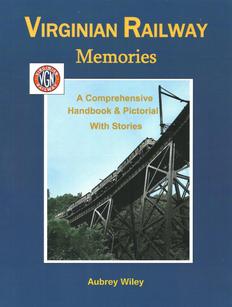 |
Virginian Railway Memories |
| The Virginian Railway was built in the first decade of the twentieth century and flourished until being merged in N&W in 1959. With over 400 color and classic black & white pictures, the book tells the story of a most modern, colorful and interesting railroad. It includes 16 well written personal stories by people who worked on the old Virginian, had family who worked on the railroad or lived nearby. A good deal of local history is covered for dozens of cities, towns and communities served by the Virginian from Norfolk, Virginia, across south side Virginia, through the Piedmont, into the mountain foothills and deep in the coalfields of West Virginia. Maps, data and plans are in abundance to support the revelations found in this book.
This book is perfect for railroad historians, railfans, local and regional historians and model railroaders.
Hardcover, 233 pages
by Aubrey Wiley |
| SKU# 138.193 |
$49.95 |
 |
|
|
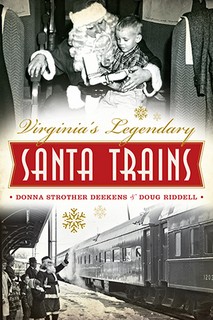 |
Virginia’s Legendary Santa Trains |
| 192 pages and 60 black and white photos. An oral history, well researched and written on the history of the Santa Claus special trains. There was a special focus on the N&W and its trains beginning in the late 1950s, Santa Trains carried delight-filled children from Roanoke, Richmond, Lynchburg. Heartwarming memories of Christmases past and chronicle the history of Virginia’s Kris Kringle trains.
192 pages
Donna Strother Deekens and Doug Riddell |
| |
Virginia’s Legendary Santa Trains |
SKU# 138.214 |
$19.95 |
 |
|
|
|
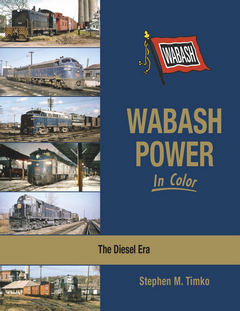 |
Wabash Power in Color: The Diesel Era |
| Diesel power is covered in full from a single, small General Electric switcher, to the monster FM Train Masters. Includes an in-depth look at the Canadian F’s, and the second-generation orders from Alco, EMD, and GE—including units ordered by the Wabash but delivered as Norfolk & Western.
Shipping early February
128 page hardcover
By Stephen M. Timko |
| |
Wabash Power in Color: The Diesel Era |
SKU# 138.220 |
$69.95 |
 |
|
|
|
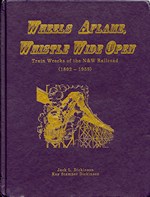 |
Wheels Aflame, Whistle Wide Open |
| Train Wrecks of the N&W Railroad
Covering wrecks in West Virginia from 1892 through 1959.
Hardcover, 299 pages
By Jack L. Dickinson and Kay Stamper Dickinson |
| SKU# 138.146 |
$25.00 |
 |
|
|
|
|


